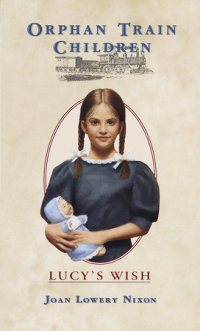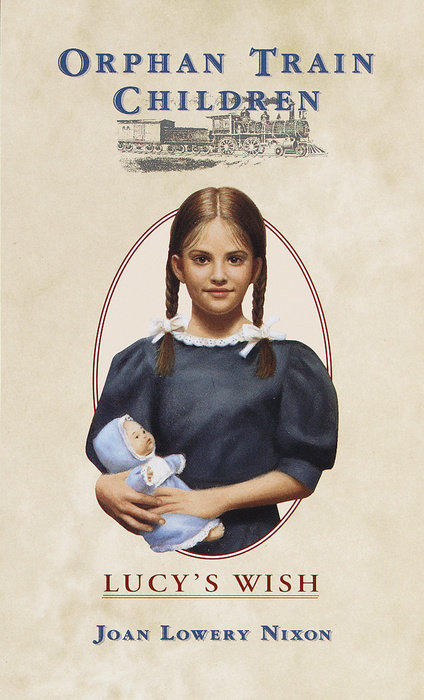Lucy Amanda Griggs squirmed between the two large boxes she had found in the alley. Even though she was very tired, she couldn't sleep. The ground was hard and lumpy, and the bright morning sunlight forced Lucy to open her eyes.
She tugged her ragged shawl up to cover her head. Her hair felt damp and greasy. How long had it been since she'd had a bath? Lucy couldn't remember.
She smiled at Baby, cradling the doll in her arms. One side of Baby's face was covered with a spiderweb of cracks. And there was a hole in her cloth body, where Lucy had to keep poking the stuffing back inside. Lucy didn't care. She had found Baby in a trash bin. She knew that Baby needed her, and she needed Baby. The cracks, the faded dress, and the hole didn't matter. From the moment Lucy saw Baby she loved her.
Lucy rocked Baby and sang to her. It was a soft, sleepy song that Lucy's mother had always sung to her. "Rock, rock, my baby-o. Rock, rock,…
Lucy Amanda Griggs squirmed between the two large boxes she had found in the alley. Even though she was very tired, she couldn't sleep. The ground was hard and lumpy, and the bright morning sunlight forced Lucy to open her eyes.
She tugged her ragged shawl up to cover her head. Her hair felt damp and greasy. How long had it been since she'd had a bath? Lucy couldn't remember.
She smiled at Baby, cradling the doll in her arms. One side of Baby's face was covered with a spiderweb of cracks. And there was a hole in her cloth body, where Lucy had to keep poking the stuffing back inside. Lucy didn't care. She had found Baby in a trash bin. She knew that Baby needed her, and she needed Baby. The cracks, the faded dress, and the hole didn't matter. From the moment Lucy saw Baby she loved her.
Lucy rocked Baby and sang to her. It was a soft, sleepy song that Lucy's mother had always sung to her. "Rock, rock, my baby-o. Rock, rock, my baby."
But Lucy's song melted into tears as memories of her mother swept over her.
She angrily brushed the tears away. Crying didn't help. Lucy remembered the time when Mum had told her that Father had been killed in an accident. It was four years ago. Lucy and Mum had clung to each other and sobbed, but their tears hadn't brought Father back.
Lucy shivered and hugged Baby tightly. She thought about the terrible day when Mum had died of cholera. That was four--or was it five?--weeks ago. Inspectors from the Metropolitan Board of Health had hurried into Lucy and Mum's room. The inspectors were afraid that the disease would spread. Cholera had already killed more than two thousand New Yorkers. Even before the inspectors left, the landlord, Mr. Beam, had ordered Lucy to leave the building.
He had clutched her shoulder as he pushed her toward the doorway. "It's a matter of business. I've got to clean up that room and rent it to someone who can pay," he'd said. His eyes were not on Lucy, but on the inspectors.
Lucy had been so frightened that her heart had pounded. She'd clenched her hands to keep them from shaking. "But, sir, I've got nowhere to go," she had pleaded.
Mr. Beam had glanced nervously at the inspectors. He had lowered his voice and answered, "I can't worry about your problems. I've got enough of my own. The Board of Health like to have ruined me last February. They blame the landlords for the cholera that swept through this city."
He had cleared his throat with an angry harumph! and added, "Meeting their demands to clean up and make repairs cost me a great deal of money. I've nothing to spare, so don't be coming to me for help."
Weak from fear, but with no choice, Lucy had wandered out to the street. She had plopped down on a curb, heedless of the hooves of the horses and the heavy wagon wheels that rumbled near her toes. She had wept in sorrow, but her tears hadn't brought Mum back. They hadn't helped at all.
As Lucy's sobs became dry shudders, she had looked up and seen the Olneys' butcher shop across the street.
Sometimes Mum, with Lucy in hand, had stopped by the shop. Sometimes she had managed to come up with enough coins to buy a small piece of meat or a soup bone. And sometimes Mum had played with and talked to the Olneys' son, Henry.
Mrs. Olney looked unhappy whenever anyone asked her about Henry. "Never been right in the head since he was born," she said. "Can't nothin' be done about it."
Mum had treated Henry the way she treated everybody else. Henry tried to talk to Mum, and Mum seemed to understand. When she paid attention to Henry, he smiled and laughed.
Once Lucy overheard another neighbor say, "I'm always kind to the lad. I tell myself, "There but for the grace of God go I.'"
Under her breath, so that only Lucy could hear, Mum had whispered, "I tell myself, "There go I.'"
Later, when they were alone, Lucy had asked Mum, "Why is Mrs. Olney always so cross? Why doesn't she ever talk to Henry?"
Mum had shaken her head sadly. "Mrs. Olney wanted a strong, healthy child who could work in the shop and learn his father's trade. She's so bitter, she can't see that Henry has feelings like everyone else."
Lucy thought about the blue-and-green marble Mum had found and had given to Henry. He had laughed and clapped his hands with joy. "You know what Henry likes, and you can talk with him," Lucy had said. "I wish Mrs. Olney would try."
"Maybe someday she will," Mum had said. "For now, you and I will be Henry's friends."

